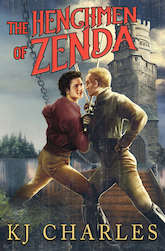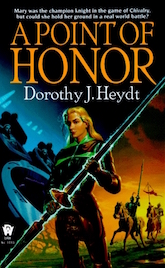Stories about imaginary countries are, I feel, sufficiently science fictional (or fantastical) to count as SFF. And Anthony Hope’s 1894 adventure novel The Prisoner of Zenda with its imaginary country of Ruritania has inspired a number of science fiction and fantasy writers, not to mention writers of romance. Now K.J. Charles, whose works frequently combine fantasy and queer romance, has written a response to The Prisoner of Zenda: The Henchman of Zenda.
Buy the Book


The Henchmen of Zenda
The Henchman of Zenda doesn’t have a fantasy element bar the conceit of Ruritania. It’s written as an account of the events of The Prisoner of Zenda from the point of view of Mr. Jasper Detchard, an Englishman in the employ of The Prisoner of Zenda‘s major villain, Michael, Duke of Strelsau. Detchard is a mercenary with a handful of friends, and one of those friends is Antoinette de Mauban, mistress to the duke. The duke’s a very abusive asshole, and he’s using Antoinette’s young daughter to control her. Detchard’s here to help—and not incidentally, add his tuppence worth of intrigue to the twisty stew that’s Ruritanian politics.
Of course, things get even more complicated when Detchard makes the acquaintance of the dashing Ruritanian noble Rupert of Hentzau, who has intrigues of his own. Rupert and Detchard share a mutual attraction, but are they even on remotely the same side? Sex, betrayal, swordfights, more intrigue, and Rudolf Rassendyll being an unbearable ass ensue. This is an incredibly fun book, one that doesn’t take itself at all seriously and still manages to create moments of real pathos. Charles has a deft touch with characterisation and pacing, and in a subtle dig at the original Prisoner of Zenda, it turns out that the women are much more effective intriguers than any of the men.
Dorothy J. Heydt’s A Point of Honor is another novel set largely in an imaginary country, but in A Point of Honor’s case, that country is a digital one. First published in 1998, A Point of Honor is very much of its time in its optimistic view of full-sensory-input virtual reality and its treatment of the digital world—coding and hacking is just like magic, because of course it is. But it’s a really rather fun novel.
Buy the Book


Mary Craven is a professional sportswoman in the digital world of Chivalry, where she competes as the knight Mary de Courcy in the lists. She makes a living because she’s good at it, and can get ransom from her victories. When she defeats a young unknown, he offers her ransom in the form of a piece of digital real estate, and immediately after that the weird shit starts: her plane has to make an emergency landing, there’s an intruder in her house, someone tries to kill her. She feels that someone’s watching her within the game world itself, and turns to one of the founders and developers, Greg (who operates a persona as Benedictine Brother Gregory) to help her get to the bottom of things.
Greg suggests she investigate the piece of digital real estate, which is a manor that shouldn’t actually exist. When she does, she and Greg find themselves stumbling over a conspiracy that involved lots of money, stolen intellectual property, and real-world consequences. There’s real peril associated with Chivalry now, and it’s up to Mary and Greg to make things right.
This may involve fighting digital dragons.
An entertaining story, it may have seemed plausible when written but won’t now. That doesn’t mean it’s not a lot of fun.
What are you guys reading lately?
Liz Bourke is a cranky queer person who reads books. She holds a Ph.D in Classics from Trinity College, Dublin. Her first book, Sleeping With Monsters, a collection of reviews and criticism, was published in 2017 by Aqueduct Press. It’s a finalist for the 2018 Locus Awards and is nominated for a Hugo Award in Best Related Work. Find her at her blog, where she’s been known to talk about even more books thanks to her Patreon supporters. Or find her at her Twitter. She supports the work of the Irish Refugee Council and the Abortion Rights Campaign.










